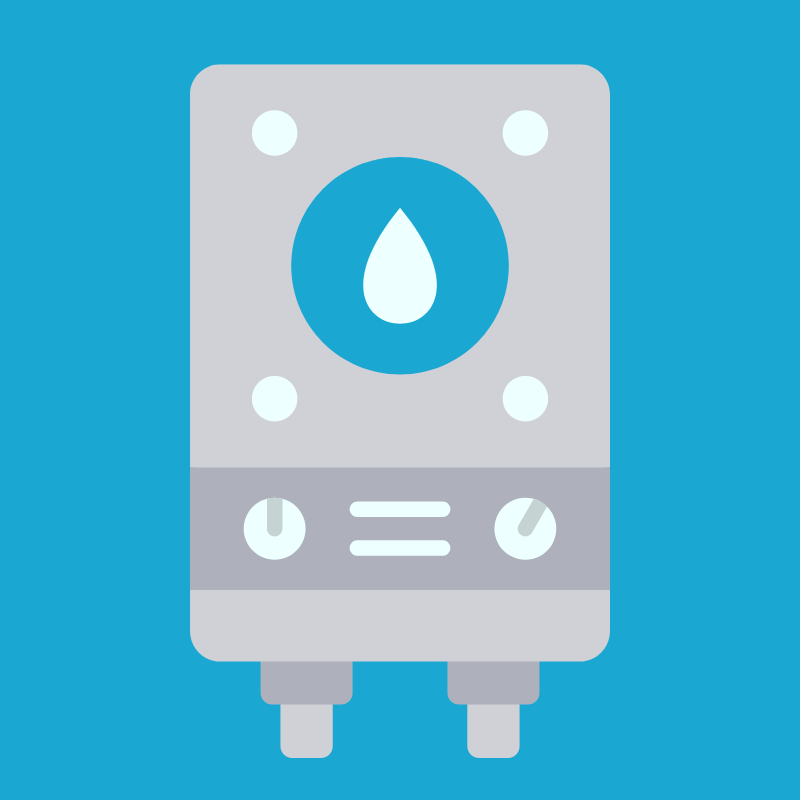For many years, the population has relied on traditional tank-style water heaters to fulfill their hot water needs. While they are still considered the gold standard of water heaters, tankless heater sales are on the rise, and for good reason. They are more energy efficient and kinder to the environment, and they eliminate the fear of flooding, which is a common threat to conventional heaters.
In this article, we will explain tankless water heaters and the differences between condensing and non-condensing models. We will then evaluate these two options by comparing their energy efficiency, ventilation needs, and environmental effects.
What Is A Tankless Water Heater?
Tankless water heaters are growing in popularity over traditional tank-style water heaters for many reasons. Unlike tank-style heaters that require a water storage tank, tankless heaters work by heating water supplied directly from the main water supply. Then, using either a gas burner or an electric heating coil, they heat water instantaneously to fulfill a home’s hot water demands.
Tankless heaters use less energy to operate than conventional models but have the capacity to produce up to five gallons of hot water per minute. Their on-demand capabilities, along with boasting a two-times longer lifespan, make tankless heaters a great option. They are space-saving appliances, and because they do not use a storage tank, they eliminate the dreaded fear of a bursting tank and a flooded home.
Energy Efficiency
The Uniform Energy Factor (UEF) is a rating used in the water heater industry that measures a water heater’s energy efficiency. It is useful for comparing different brands and models of water heaters and simplifying the purchasing process by providing a more realistic and accurate assessment of the cost of running a particular water heater. The UEF ratings between condensing and non-condensing are significant and translate into substantial cost differences. Here, we will compare the two.
Non-Condensing UEF
A non-condensing tankless water heater has a UEF rating between .80 and .85, which represents the amount of energy the water heater uses to heat water in relation to the total amount of energy the appliance requires to run. These heaters offer energy reduction compared to tank-style heaters, but because they exhaust combustion gases without extracting additional heat, they are less energy efficient than condensing models.
Condensing UEF
Condensing models are designed to be more energy efficient. With a UEF of .90 or higher, condensing tankless water heaters are far better able to convert the energy they use into heat. They enjoy this more efficient rating because they do recycle the exhaust gases produced by the water heater combustion process and use them as an additional heat source.
Ventilation
Tankless water heaters require air intake and exhaust pipes, which can be installed by exiting a side wall or through the roof. They can use direct vents, which are a two-vent system with one pipe bringing in fresh air and one expelling it. There are also non-direct vents that utilize one pipe for both purposes. Here, we explain the differences between venting a non-condensing heater and venting a condensing model.
Non-Condensing Model
Similar to condensing models, when combustion takes place, the burner heats at 1650 degrees Fahrenheit, but the exhaust gases exit at a much higher temperature, usually between 300 and 400 degrees, compared to 80 to 90 degrees for condensing models. This hot exhaust requires the venting materials to be made of metal to withstand this higher heat, which means the venting portion of the installation is more costly.
Condensing Models
When a tap is opened and hot water is requested, cold water enters the tankless heater, and combustion takes place. With a condensing heater, the combustion process generates exhaust gases, which are sent to a secondary heat exchanger. As this gas cools, water vapor in the exhaust turns into an acidic liquid while producing additional heat energy that is used to warm the incoming cold water in the primary heat exchanger.
The liquid condensate is collected and then ejected into a nearby floor drain or pumped to a pipe, depending on local codes. Because of the condensate’s acidic nature, a neutralizer is often recommended to protect the interior of the pipe from corrosion.
The exhaust in a condensing model is substantially cooler, which allows non-metal materials to be used for venting. Popular choices are plastic PVC and polypropylene, which are lightweight, easy to cut and install, and substantially reduce the overall costs.
Environmental Effects
Today’s culture is concerned about the environment and the forces at work that leave behind dangerous greenhouse gases that threaten our safety. When it comes to tankless water heaters, both condensing and non-condensing types produce greenhouse gases, although condensing models produce less. If the environment’s health is of concern and you still desire a tankless heater, then an electric model may be a better choice.
Uses Less Energy
Both condensing and non-condensing tankless water heaters use less energy compared to tank-style heaters. Not only does the technology increase energy efficiency, but the need to continuously heat and reheat water like a traditional heater is eliminated since tankless heaters heat only the water that is needed.
Conservation Of Water
Because hot water is instantly available from a tankless water heater, the need to run a faucet for a minute or more until hot water arrives stops. This saves water waste and further enhances the environment.
Durability
Since tankless heaters boast a 20-plus-year life span as opposed to ten years for a traditional heater, they are less frequently replaced. This means that fewer tankless heaters are being sent to landfills.
Are You Looking To Upgrade To A Tankless Water Heater?
Tankless water heaters are an excellent investment for those concerned about the health of our planet. They are energy-saving appliances that provide unlimited hot water on demand, and when properly sized, they can accommodate a family’s hot water needs.
We are experts in installing, servicing, and maintaining condensing and non-condensing tankless water heaters and can assist with selecting the type that best suits your family’s needs.
Call us to schedule an appointment so we can assess your hot water requirements while providing you with the exemplary service, rock-solid knowledge, and honesty you deserve and expect.

